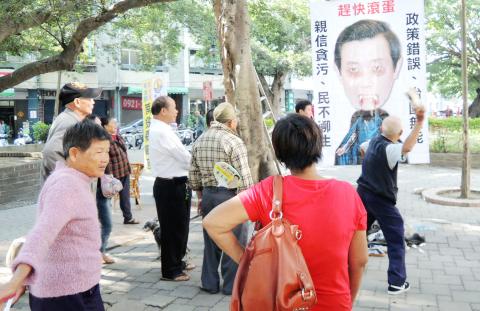The majority of Taiwanese favor increased cross-strait exchanges, but appear to be very cautious about a peace agreement between Taiwan and China, the results of a public opinion poll released yesterday showed.
Asked if they support the signing of a bilateral peace agreement, with President Ma Ying-jeou (馬英九) pledging “10 guarantees” in 2011, almost 70 percent of the respondents in a poll conducted by Taiwan Indicators Survey Research (TISR) said negotiations for such an accord should not begin before receiving authorization from a national referendum.
The poll found that 26.8 percent of respondents said negotiations should only begin after a referendum, 17.1 percent said the government should negotiate first and put the result to a referendum, and 41.5 percent said that both the beginning of negotiations and the results should be authorized by referendums.

Photo: Hsieh Chieh-yu, Taipei Times
“That means a total of 68.3 percent of those polled would grant a go-ahead to negotiations for a peace deal only after a national referendum,” TISR general manager Tai Li-an (戴立安) said in a press release.
Approximately the same percentage of respondents, 67.9 percent, opposed the notion that if a cross-strait peace pact was signed, unification with China should be recognized as a national goal, with 17.2 percent supportive and 15 percent declining to provide an answer.
In a question that allowed respondents to make multiple choices, most expressed support for increased bilateral exchanges, including mutual visits by officials of the Mainland Affairs Council and China’s Taiwan Affairs Office (60.2 percent), the establishment of representative offices on each other’s territory (57.5 percent) and shortening Chinese spouses’ waiting period for identification cards from six years to four (52.4 percent).
The support rate for trade pacts were lower, with 35.2 percent of those polled supporting a cross-strait trade in goods agreement and 31.8 percent supportive of the service trade pact, which was signed in June.
The respondents’ reaction to the order of priority between the service trade agreement and the trade in goods agreement, which is yet to be signed, appeared to be split, with 36.2 percent saying that the trade in goods pact could be signed before the current dispute over the service trade pact is settled, 42.7 percent opposing the proposal and 22.8 percent declining to answer.
The poll found Ma’s approval rating remained low at 14.3 percent, while his disapproval rating was 71.7 percent.
“A notable fact was that Ma’s disapproval rating was around 80 percent among respondents between 20 and 49 years old,” Tai said.
Premier Jiang Yi-huah’s (江宜樺) disapproval rating of 58.6 percent was the highest since he assumed the post in February, according to the poll.
The survey, conducted between Monday and Tuesday, collected 1,007 valid samples and had a margin of error of 3.1 percentage points.

Taiwanese can file complaints with the Tourism Administration to report travel agencies if their activities caused termination of a person’s citizenship, Mainland Affairs Council Minister Chiu Chui-cheng (邱垂正) said yesterday, after a podcaster highlighted a case in which a person’s citizenship was canceled for receiving a single-use Chinese passport to enter Russia. The council is aware of incidents in which people who signed up through Chinese travel agencies for tours of Russia were told they could obtain Russian visas and fast-track border clearance, Chiu told reporters on the sidelines of an event in Taipei. However, the travel agencies actually applied

Japanese footwear brand Onitsuka Tiger today issued a public apology and said it has suspended an employee amid allegations that the staff member discriminated against a Vietnamese customer at its Taipei 101 store. Posting on the social media platform Threads yesterday, a user said that an employee at the store said that “those shoes are very expensive” when her friend, who is a migrant worker from Vietnam, asked for assistance. The employee then ignored her until she asked again, to which she replied: "We don't have a size 37." The post had amassed nearly 26,000 likes and 916 comments as of this

New measures aimed at making Taiwan more attractive to foreign professionals came into effect this month, the National Development Council said yesterday. Among the changes, international students at Taiwanese universities would be able to work in Taiwan without a work permit in the two years after they graduate, explainer materials provided by the council said. In addition, foreign nationals who graduated from one of the world’s top 200 universities within the past five years can also apply for a two-year open work permit. Previously, those graduates would have needed to apply for a work permit using point-based criteria or have a Taiwanese company

The Shilin District Prosecutors’ Office yesterday indicted two Taiwanese and issued a wanted notice for Pete Liu (劉作虎), founder of Shenzhen-based smartphone manufacturer OnePlus Technology Co (萬普拉斯科技), for allegedly contravening the Act Governing Relations Between the People of the Taiwan Area and the Mainland Area (臺灣地區與大陸地區人民關係條例) by poaching 70 engineers in Taiwan. Liu allegedly traveled to Taiwan at the end of 2014 and met with a Taiwanese man surnamed Lin (林) to discuss establishing a mobile software research and development (R&D) team in Taiwan, prosecutors said. Without approval from the government, Lin, following Liu’s instructions, recruited more than 70 software